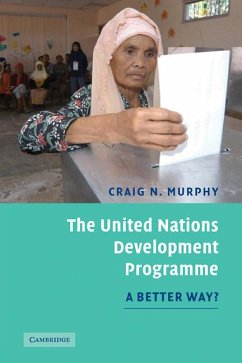The first authoritative and accessible history of the United Nations Development Programme and its predecessors.
The United Nations Development Programme is the central network co-ordinating the work of the United Nations in over 160 developing countries. This book provides the first authoritative and accessible history of the Programme and its predecessors. Based on the findings of hundreds of interviews and archives in more than two dozen countries, Craig Murphy traces the history of the UNDP's organizational structure and mission, its relationship to the multilateral financial institutions, and the development of its doctrines. He argues that the principles on which the UNDP was founded remain as relevant in a world divided by terrorism as they were in the immediate aftermath of the Second World War, as are the fundamental problems that have plagued the Programme from its origin, including the opposition of traditionally isolationist forces in the industrialized world.
Review quote:
'Students of development, the UN, and international relations have waited a long time for this authoritative examination of the UNDP. Informative, provocative, and controversial - this book provides the largest remaining missing piece in the historical puzzle of post-war multilateralism.' Thomas G. Weiss, Presidential Professor, CUNY Graduate Center, and Co-director, UN Intellectual History Project
Table of contents:
1. Not the standard image; 2. Development and the United Nations; 3. Institutions for practical solidarity; 4. Decolonization and economic transformation; 5. Lewis in Ghana and after; 6. Capacity, consensus, crisis, and consequences; 7. Engaging liberation movements and revolutionary states; 8. A learning organization: women, Latin America, and Africa; 9. 'Bottoms Up' development helps make UNDP a mammal; 10. Working for 'a holy man' after the cold war; 11. 'Fabian socialists do not make the cut'; 12. 'Ploughing the sea'? UNDP and the future of global governance.
Hinweis: Dieser Artikel kann nur an eine deutsche Lieferadresse ausgeliefert werden.
The United Nations Development Programme is the central network co-ordinating the work of the United Nations in over 160 developing countries. This book provides the first authoritative and accessible history of the Programme and its predecessors. Based on the findings of hundreds of interviews and archives in more than two dozen countries, Craig Murphy traces the history of the UNDP's organizational structure and mission, its relationship to the multilateral financial institutions, and the development of its doctrines. He argues that the principles on which the UNDP was founded remain as relevant in a world divided by terrorism as they were in the immediate aftermath of the Second World War, as are the fundamental problems that have plagued the Programme from its origin, including the opposition of traditionally isolationist forces in the industrialized world.
Review quote:
'Students of development, the UN, and international relations have waited a long time for this authoritative examination of the UNDP. Informative, provocative, and controversial - this book provides the largest remaining missing piece in the historical puzzle of post-war multilateralism.' Thomas G. Weiss, Presidential Professor, CUNY Graduate Center, and Co-director, UN Intellectual History Project
Table of contents:
1. Not the standard image; 2. Development and the United Nations; 3. Institutions for practical solidarity; 4. Decolonization and economic transformation; 5. Lewis in Ghana and after; 6. Capacity, consensus, crisis, and consequences; 7. Engaging liberation movements and revolutionary states; 8. A learning organization: women, Latin America, and Africa; 9. 'Bottoms Up' development helps make UNDP a mammal; 10. Working for 'a holy man' after the cold war; 11. 'Fabian socialists do not make the cut'; 12. 'Ploughing the sea'? UNDP and the future of global governance.
Hinweis: Dieser Artikel kann nur an eine deutsche Lieferadresse ausgeliefert werden.








